How AI Is Shaping Real-World Biology Careers
The Future of Biology: No Longer in the Laboratory Alone, But in the Code. The integration of AI in Biology jobs is revolutionizing the field beyond conventional laboratory Research work.
For ages, Biology and Life Sciences have been defined by a lot of things. It could be the microscopes revealing magical life forms, sophisticated hum of laboratories, field journals filled with patient records and observations, or test tubes and beakers bubbling with Chemical and Life possibilities.
Well, by the year 2025, that conventional picture has changed and is evolving. Life’s language is no longer written only with Chemicals and cells; it is being decoded through ML (Machine Learning) models and Algorithms.
This shift is quite revolutionary for this futuristic world, reshaping Research as well as opening new doors to AI careers in Life Sciences. Because of this shift, Diseases and Disorders can now be predicted well before their onset. Crops are being engineered to withstand adverse situational and climatic conditions. And drugs are being designed in silico long before they enter the Research laboratory.
The processes that once took almost decades of trial and error methodologies are now unfolding new approaches in days, powered by futuristic machine intelligence.
This isn’t just a story of innovation and Research, but it is a story of futuristic opportunities, especially in the fast-growing field of AI in Biology Jobs.
Scientists, professionals, as well as students who are ready to build a bridge between Biology and AI (Artificial Intelligence) will witness careers that are both deeply meaningful and in high demand. The evolving roles would shape sustainability, Healthcare, Life Sciences, as well as the future of mankind and Mother Nature.
Do you wonder why Biology or Life Sciences require AI in 2025, and what career paths are emerging from this robust merger? If so, then how would you position yourself at the center to be part of a revolutionary and evolving movement that is rewriting the rules of Life Science? You’ll find that out in this article, so let’s go!
Why AI and Machine Learning Are Transforming Biology
One of the primary reasons for the need is the rise of AI in Biology Jobs, as data complexity has surpassed what traditional methods can handle.
Biology and Life Sciences today generate huge amounts of data at a remarkable rate. Every Clinical Trial completed, every Genetically engineered crop, and every Genome sequenced adds to the mountain of Biological information globally. Conventional methodology alone can’t keep up with the Biological complexity worldwide.
AI/ML fills in the methodological gap by providing:
- Prediction: AI/ML Models can forecast Biological outcomes, such as crop yields, drug responses, as well as disease progression.
- Accuracy: AI can detect patterns and correlations that are invisible to manual analysis.
- Speed – Algorithms can process TB (Terabytes) of Biological data in hours, a task that would take humans years.
It is fueling a surge in AI & Bioinformatics jobs, as leading organizations seek professionals who can make sense of complex data altogether. These capabilities are advancing Agriculture, Healthcare, sustainability, as well as Biotechnology. It is fueling demand for professionals who can bridge the gap between Biology and AI.
Emerging AI & ML-driven Biology Jobs & Careers in 2025
Given below is an overview of the most impactful AI in Biology Jobs emerging at the intersection of Life Sciences and ML:
|
Job Title |
Prime Roles | Skills Needed | Biology Focus Area |
Industries Hiring |
|
Computational Biologist |
Simulates Genetic networks, predicts disease pathways, and interprets Genomic data | Python, R, ML models, Biological databases, data visualization | Genomics, Systems Biology |
Pharma, Research Institutes, Academic Labs |
|
Bioinformatics Data Scientist |
Analyzes sequencing datasets, identifies Biomarkers, and supports Precision Medicine | Big data handling, NGS pipelines, cloud computing, AI-driven analytics | Genomics, Proteomics, Transcriptomics |
Biotech, Genomics Firms, Precision Medicine Startups |
|
AI Drug Discovery Scientist |
Designs drugs with ML, predicts molecule behavior, and reduces development costs | Cheminformatics, Molecular Modeling, reinforcement learning, Predictive Analytics | Pharmacology, Structural Biology |
Biopharma, AI-driven Drug Discovery Startups |
|
Biomedical Image Analyst |
Builds AI models to detect diseases early, classify cells, and track outcomes | Deep learning (CNNs), computer vision, Medical Imaging Software, and applied Statistics | Medical Imaging, Histopathology |
Hospitals, Diagnostics Companies, MedTech |
|
Synthetic Biology & AI Engineer |
Uses AI to design organisms for fuels, medicines, and sustainable products | Systems Biology, ML-based modeling, Genetic circuit design, experimental optimization | Synthetic Biology, Metabolic Engineering |
Industrial Biotech, Green Tech, Pharma |
|
Healthcare AI Specialist |
Integrates AI into hospitals, ensures ethical use, and enables personalized care | Clinical data analysis, Healthcare AI tools, Regulatory Compliance, Ethics | Healthcare, Personalized Medicine |
Hospitals, Healthcare IT, Policy & Regulatory Bodies |
|
Agrigenomics & AI Scientist |
Develops AI-driven resilient crops, optimizes yield, and improves sustainability | Plant Genomics, predictive analytics, ML algorithms, and precision Agriculture tools | Agriculture, Plant Biotechnology |
AgriTech Startups, Food Security Orgs, Research Institutes |
This table not only showcases the variety of roles but also highlights how each one directly contributes to solving global challenges, whether it is improving Healthcare, ensuring food security, or advancing sustainability.
How AI Is Shaping Real-World Biology Careers
To make AI in Biology Jobs more concrete, here are real-world examples of AI in action across industries:
- Drug Discovery: Bengaluru startup Innoplexus and UK-based Exscientia use AI to accelerate drug design, reducing timelines from years to months. This highlights the growing importance of AI in Drug Discovery for Scientists.
- Genomics & Precision Medicine: The Genome India Project applies AI to analyze thousands of Genomes, opening opportunities for Computational Biologists and Bioinformatics Data Scientists in population Health Research.
- Agrigenomics: Indian AgriTech startups and firms, such as Nuziveedu Seeds, utilize AI to develop climate-resilient crops, highlighting the critical role of agrigenomics and AI Scientists in Sustainable Agriculture.
- Medical Imaging: Hospitals, such as AIIMS Delhi, implement AI to detect Cancers and neurological disorders early, demonstrating how Biomedical Image Analysts contribute directly to modern Healthcare.
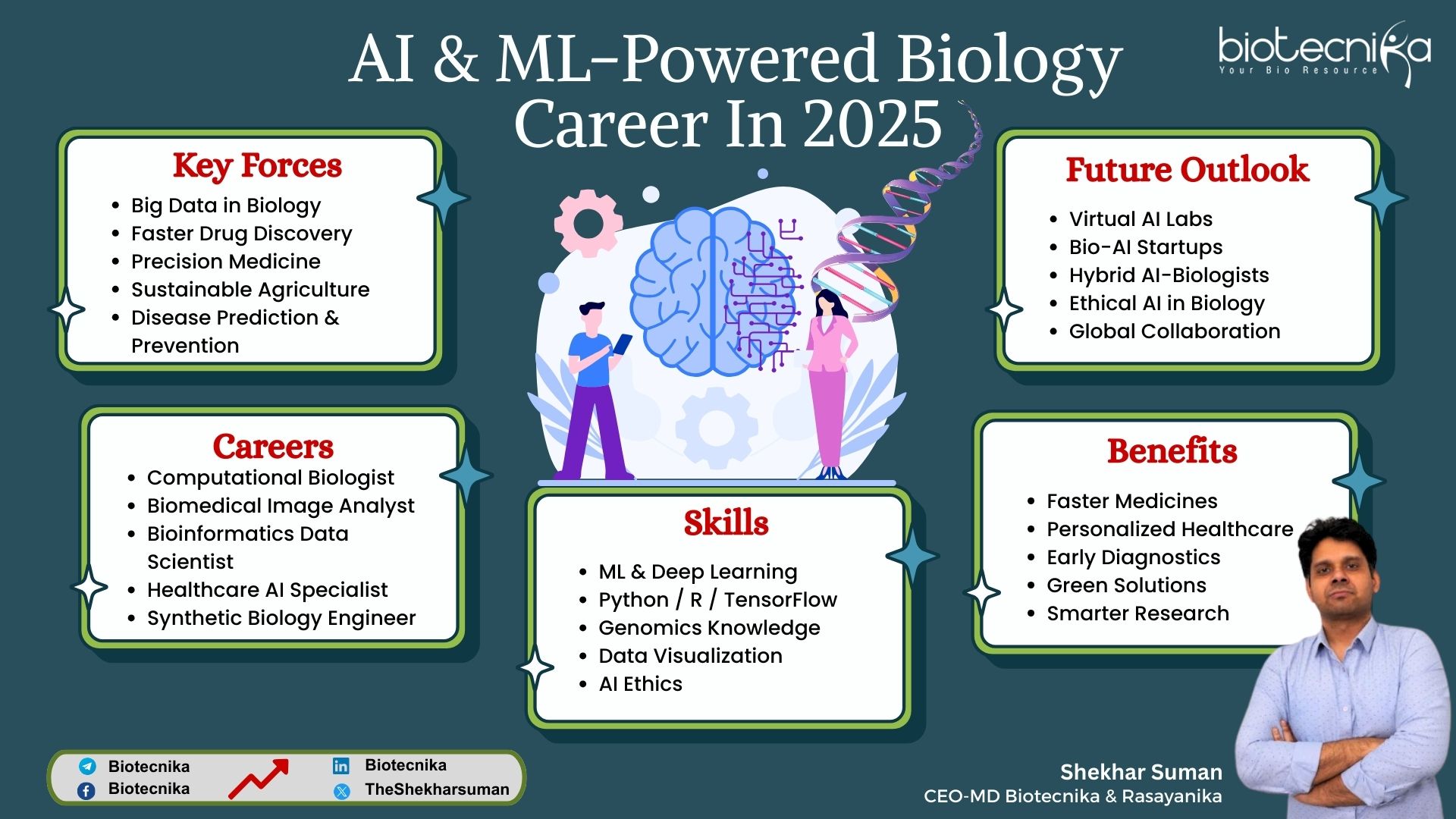
Key Roles in AI-Powered Biology Careers: Qualifications and Growth Opportunities
01 Computational Biologist
In 2025, Computational Biologists are not just analyzing DNA, they are simulating Genetic interactions, modeling diseases, and uncovering pathways that guide Personalized Medicine. Their work is crucial in areas such as cancer genomics and rare disease Research.
- Qualifications: MSc (Master of Science) or PhD (Doctor of Philosophy) in Bioinformatics, Systems Biology, or Computational Biology.
- Growth Potential: Opportunities to specialize in areas such as Pharmacogenomics or Systems Biology, with potential for leadership roles in R&D (Research & Development) projects, making Computational Biology one of the most future-proof areas in AI in Biology Jobs.
02 Bioinformatics Data Scientist
With sequencing costs falling, Bioinformatics experts are essential for managing vast datasets. They apply ML to detect Biomarkers, interpret Clinical Trial data, and support Precision Medicine initiatives.
- Qualifications: MSc or PhD in Bioinformatics, Computational Biology, or related fields.
- Growth Potential: Advancement to roles such as Bioinformatics Lead or Director of Data Science, with increasing responsibilities in strategic decision-making.
03 AI Drug Discovery Scientist
Traditional Drug Development takes more than a decade. AI Scientists accelerate this by predicting molecule behavior, virtually screening compounds, and designing drugs with higher success rates. Startups and big Pharmaceutical alike are investing heavily in these roles.
- Qualifications: PhD in Pharmacology, Medicinal Chemistry, or related disciplines, with expertise in ML applications.
- Growth Potential: Pathways to senior positions, such as CSO (Chief Scientific Officer) or Head of Drug Discovery, influencing the direction of Pharmaceutical R&D.
04 Biomedical Image Analyst
From MRI scans to Pathology slides, Biomedical image analysts use AI to improve Diagnostics. AI in Biology Jobs and Deep learning models can now detect Cancer at earlier stages, track disease progression, and guide treatment decisions in real time.
- Qualifications: MSc or PhD in Biomedical Engineering, Medical Imaging, or related fields.
- Growth Potential: Opportunities to lead imaging departments or transition into roles focusing on AI integration in Diagnostics.
05 Synthetic Biology & AI Engineer
Synthetic Biology utilizes AI to design organisms with desirable traits, produce biofuels, create bioplastics, or engineer microbes. AI models help predict outcomes before experiments, saving time and resources while driving sustainable innovations.
- Qualifications: MSc or PhD in Synthetic Biology, Biotechnology, or related fields, with proficiency in AI and ML techniques.
- Growth Potential: Potential to lead innovation laboratories or become Chief Technology Officer (CTO) in Biotechnology firms focusing on sustainable solutions.
06 Healthcare AI Specialist
These specialists ensure that AI in hospitals and in broader AI in Biology Jobs is both practical and ethical. They integrate predictive tools into patient care while maintaining compliance with global Health Regulations and patient privacy standards.
- Qualifications: MSc or PhD in Healthcare Informatics, Data Science, or related fields, with a strong understanding of AI applications in Healthcare.
- Growth Potential: Advancement to roles such as Director of AI in Healthcare or Chief Information Officer (CIO), shaping AI strategies in Healthcare organizations.
07 Agrigenomics & AI Scientist
Food security is one of the biggest challenges of our time. Agrigenomics Scientists apply AI to design climate-resilient crops, improve yields, and create farming methods that are sustainable and efficient.
- Qualifications: MSc or PhD in Plant Genomics, Agricultural Biotechnology, or related fields, with knowledge of AI applications in Agriculture.
- Growth Potential: Opportunities to lead Research teams or become Chief Agricultural Scientist, influencing Agricultural policies and practices.
Future Perspective: Looking Beyond 2025
The integration of AI in Biology is only going to deepen. By 2030, experts predict:
- Healthcare will be predictive – Doctors will use AI to forecast diseases years before symptoms appear. This will create a surge in AI in Biology Jobs related to predictive healthcare systems and medical data science.
- Drug discovery will accelerate – Algorithms will shrink development timelines, bringing life-saving medicines to market faster.
- Agriculture will be driven by AI – climate-resilient crops and AI-managed farms will support global food security.
- Collaboration will define progress – Biologists, Computer Scientists, Engineers, and Clinicians will work together to solve humanity’s most challenging problems.
Ethics and Regulations will also take center stage. Ensuring transparency, safety, and fairness in AI-driven Biology will be as important as the innovations themselves.
Conclusion: Shaping Tomorrow with AI and Biology
2025 is more than just another year; it’s the dawn of a new era in Life Sciences. At the intersection of AI and Biology lie careers that not only offer growth but also the opportunity to tackle humanity’s biggest challenges. From life-saving Medicines to climate-resilient crops, the impact of this revolution reaches far beyond the laboratory.
For students, Researchers, and professionals, the path is clear: those who master Machine Learning alongside Biology will lead the breakthroughs of tomorrow. This is your moment not just to build a career, but to make a difference. And because of this revolution, AI in Biology Jobs has reached far beyond the Research laboratories.
The future of Biology is bold, intelligent, and collaborative. The question is no longer if you will be part of it, only how soon.
FAQs: Essential Skills and Opportunities in Futuristic Biology Career
01 What are AI & ML-driven Biology Jobs?
-> They are careers where biology meets machine learning, such as bioinformatics, drug discovery, and healthcare AI roles.
02 What skills are needed?
-> Python, Genomics, R, Data Analysis, and Machine Learning are the most essential skills for these roles.
03 Are AI-driven Biology Jobs in demand in 2025?
-> Yes, they are rapidly growing as Healthcare, Biotechnology, as well as Pharmaceutical companies adopt AI for more innovative and faster solutions.

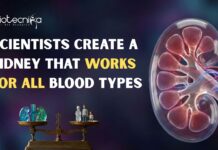
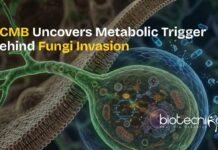


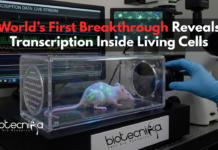















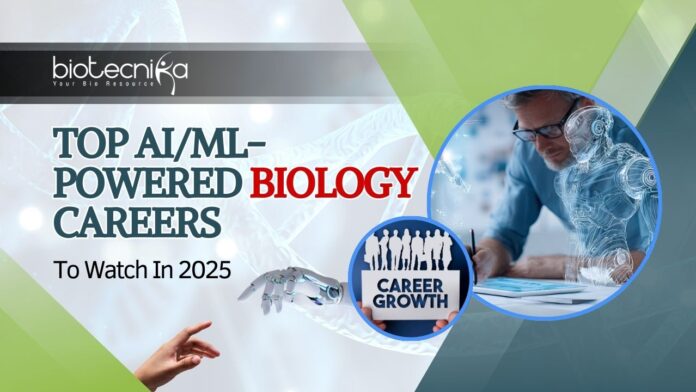

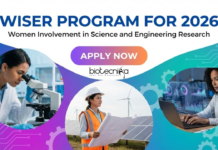
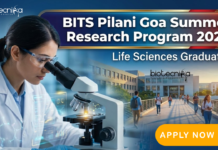
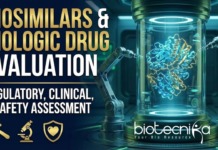





Couple of decades back, people thought, Biology and Mathematics are not connected. This is no longer true.
Easy form